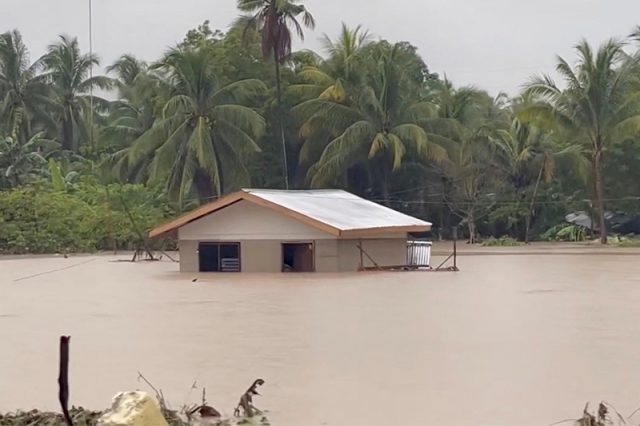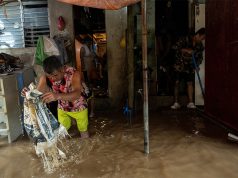
A state insurer offered calamity funds for their members who were severely affected by Severe Tropical Storm Paeng” (International name: Nalgae).
“Paeng” ravaged most parts of the country in the last week of October. It also traversed the country during “Undas” or the All Saints’ Day weekend when Filipino took time to visit their departed loved ones.
RELATED: Rundown: Funds raised for victims of ‘Paeng’ from groups, personalities
To alleviate such losses, the Social Security System (SSS) advised on Thursday, November 3 that it is offering a Calamity Assistance Package (CAP) to its members.
This can also be availed by those who reside in areas declared under a “State of Calamity” due to “Paeng.”
“Advisory! The Social Security System shall offer a Calamity Assistance Package (CAP) for victims of severe tropical storm ‘Paeng’ for SSS members residing in areas that were declared under ‘State of Calamity’ by the National Disaster Risk Reduction and Management Council (NDRRMC) or by the Sangguniang Bayan/Panlunsod/Panlalawigan,” the advisory reads.
In its latest situational report, the National Disaster Risk Reduction and Management Council (NDRRMC) said that 160 cities/municipalities were declared under a “State of Calamity” by their respective local government units.
In the infographic that accompanied the post, SSS said that the CAP includes the following:
- Calamity Loan Assistance Program (CLAP) – a maximum loanable amount worth P20,000 with a payment term of 24 months
- Three-month advance pension for SS (social security) and EC (employee compensation) pensioners
The guidelines for this financial support initiative, however, are yet to be released.
SSS’s Facebook administrator pointed this out in response to several users who asked about CAP.
“Please wait for the guidelines and qualifying conditions that the SSS will release for the Calamity Assistance Package,” the state insurer said in one of the replies.
“In the event that there is an update about this, we will immediately inform our members thru our official website and social media accounts,” it added.
SSS covers all Filipino workers who are registered within its system and their beneficiaries.
GSIS readies its own emergency funds
The Government Service Insurance System (GSIS), the state insurer for government workers, advised its members that it is also currently preparing an emergency loan for “Paeng” victims.
The loan dedicated to GSIS members who have been hit by the severe tropical storm is not yet open.
What can be availed, in the meantime, are emergency loans that cover past natural calamities.
GSIS President and General Manager Wick Veloso said this in a statement.
“As of [October 23] this year, GSIS has already released a total of P4.5 billion that provided financial assistance to almost 145,000 GSIS active members and pensioners,” Veloso said.
These disasters are the onslaught of Typhoon Karding, a strong earthquake last July and the ongoing dengue outbreak.
The executive also noted that GSIS has so far allocated P1.5 billion worth of emergency loans to its members and pensioners in 15 North Luzon areas who have been afflicted by these events.
“We hope to alleviate the plight of over 69,000 GSIS members and pensioners working or residing in the calamity-declared areas in the North due to the 7.3 magnitude earthquake in July, Typhoon Karding in September, flashfloods, and dengue outbreak,” he said.
Areas eligible for this emergency loan can be viewed on this link: Areas eligible for Emergency Loan – Government Service Insurance System (gsis.gov.ph).
Here are the requirements for members applying for a GSIS emergency loan:
- Are in active service and not on leave of absence without pay
- Have at least three months of paid premiums within the last six months
- Have no pending administrative or criminal case
- Have a net take-home pay of not lower than P5,000









